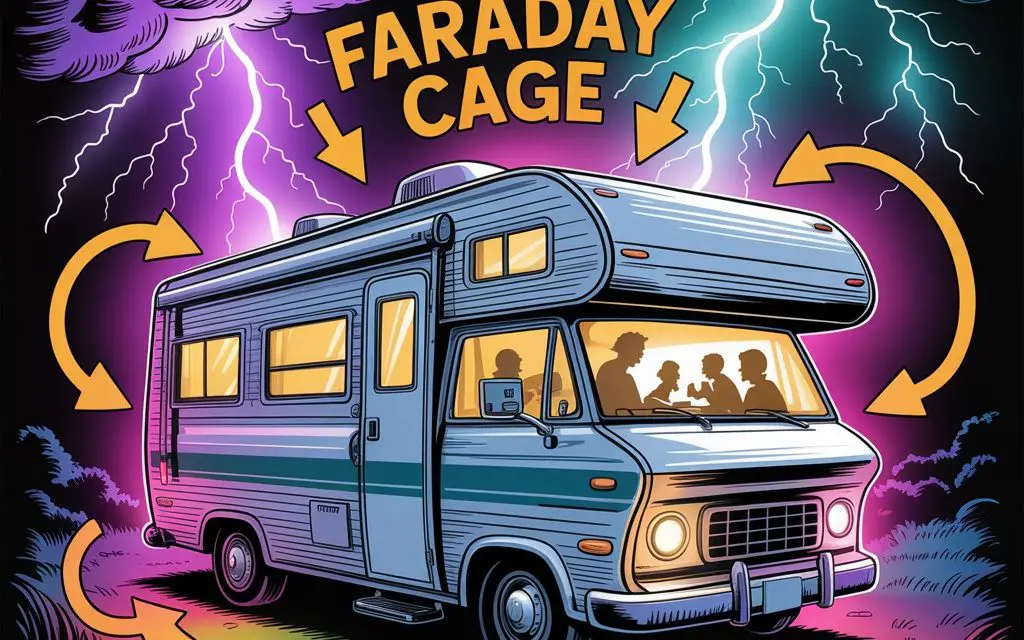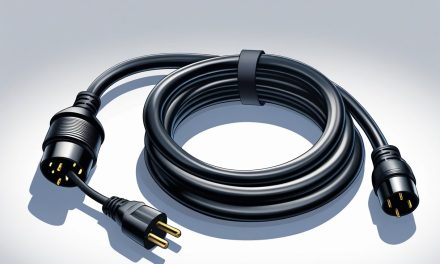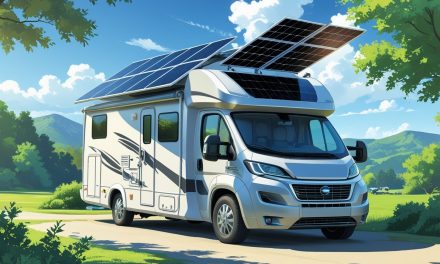Are you worried about getting struck by lightning while camping in your RV? You’re not alone! Many RV owners have nightmares about being caught in a thunderstorm. The good news is that most RVs can actually protect you from lightning strikes – but only if you know the science behind it.
In this guide, we’ll answer the burning question: “Can lightning strike an RV?” and teach you everything you need to stay safe during storms.
Quick Answer: Yes, Lightning Can Strike Your RV (But You’ll Probably Be Safe!)
The short answer is YES – lightning can absolutely strike your RV.
However, if your RV has a metal frame (aluminum or steel), you’re actually safer inside than you would be outside or in a building without proper lightning protection.
Here’s why: Your RV acts like a Faraday Cage, which means the electricity flows around the outside of your RV instead of through it. Pretty cool, right?
What is a Faraday Cage? (The Science Made Simple)
A Faraday Cage is like an invisible shield around metal objects. When lightning hits your RV:
• The electricity flows around the outside of your RV’s metal frame • It goes into the ground through your tires and metal parts • You stay completely safe inside your RV • The electricity never comes inside to hurt you
Think of it like being inside a metal bubble during a lightning storm – the electricity just bounces off!
Here’s a Great Video Explaining RV Lightning Safety:
Would you like to save this article?
Is Your RV Safe From Lightning? Check This Chart!
| RV Type | Frame Material | Lightning Safety | What to Do |
|---|---|---|---|
| Class A Motorhomes | Aluminum/Steel | ✅ SAFE | Stay inside |
| Class B Van Life | Steel | ✅ SAFE | Stay inside |
| Class C Motorhomes | Aluminum/Steel | ✅ SAFE | Stay inside |
| Travel Trailers | Aluminum frame | ✅ SAFE | Stay inside |
| Fifth Wheels | Aluminum frame | ✅ SAFE | Stay inside |
| Fiberglass RVs | Wood frame | ⚠️ DANGEROUS | Go to your tow vehicle |
| Pop-up Campers | Fabric/minimal metal | ❌ NOT SAFE | Find solid shelter |
| Tents | No metal frame | ❌ VERY DANGEROUS | Get to safety immediately |
The Truth About Rubber Tires and Lightning
MYTH BUSTED: Many people think rubber tires protect you from lightning. This is completely FALSE!
Lightning carries millions of volts – way more power than rubber can stop. Lightning can easily jump through rubber tires to reach the ground. Your safety comes from the metal frame, not the tires.
Watch This Video About the Rubber Tire Myth:
10 Lightning Safety Rules Every RVer Must Follow
🌩️ Rule #1: Know the Weather Before You Go
- Check weather apps on your phone
- Listen to NOAA weather radio
- Watch for thunderstorm warnings
- Remember: If you can hear thunder, lightning is close enough to hit you!
⚡ Rule #2: Get Inside Fast – Don’t Wait!
When you hear thunder:
- Count the seconds between lightning and thunder
- If it’s less than 30 seconds, you’re in the danger zone
- Get inside your RV immediately
- Stay inside for 30 minutes after the last thunder
🔌 Rule #3: Unplug Your RV From Campground Power
This is super important! Here’s why:
- Lightning can travel through power lines
- It can fry your RV’s electrical system
- Unplug your shore power cord
- Your RV’s battery and generator are still safe to use
🪟 Rule #4: Stay Away From Windows and Metal
Even inside your safe RV:
- Don’t touch windows or doors
- Avoid metal appliances
- Stay on soft surfaces like beds or couches
- Don’t use the shower during storms
🌳 Rule #5: Never Park Under Trees
- Trees attract lightning
- They can split and fall on your RV
- Park in open areas when storms are coming
- It’s better for lightning to hit your RV than a tree to fall on it
🏊 Rule #6: Get Away From Water Fast
- Water conducts electricity
- Get out of pools, lakes, or rivers immediately
- Dry off quickly
- Don’t fish or boat during storms
🧳 Rule #7: Secure Everything Outside
Before the storm hits:
- Bring in chairs and decorations
- Retract your awning
- Close all windows
- Bring pets inside
📱 Rule #8: Have Emergency Supplies Ready
Keep these items handy:
- Battery-powered radio
- Flashlights
- First aid kit
- Non-perishable food
- Extra water
🚗 Rule #9: Know Your Backup Plan
If your RV isn’t safe:
- Go to your tow vehicle (if it’s metal)
- Find a campground building
- Ask neighbors with safe RVs for help
- Never stay in tents or pop-ups
⏰ Rule #10: Wait It Out Completely
- Stay inside for 30 minutes after the last thunder
- Don’t rush outside too early
- Lightning can still strike after the main storm passes
What Happens When Lightning Actually Hits Your RV?
If lightning strikes your metal RV, here’s what you might experience:
✅ Good News:
- You’ll be completely safe inside
- The electricity flows around you, not through you
- Most people don’t even get hurt
⚠️ Possible Problems:
- Loud noise and bright flash
- Electronics might get damaged (TVs, phones, etc.)
- Temporary power loss
- Blown fuses in your electrical system
- Your ears might ring from the noise
💡 Fun Fact: Some RVers have been struck by lightning and didn’t even know it until they found damage later!
Real Stories: What It’s Like Inside During a Strike
Lightning Strike Statistics That Will Surprise You
Here are some shocking facts about lightning:
| Lightning Fact | Number |
|---|---|
| Lightning strikes per year in the US | 22 million |
| Chance of being struck by lightning | 1 in 600,000 |
| People killed by lightning each year | About 20 |
| Lightning temperature | 50,000°F (5x hotter than the sun!) |
| Speed of lightning | 220,000 mph |
Important: Over 60% of lightning deaths happen to people who are camping, fishing, or doing outdoor activities – just like RVers!
How to Test If Your Campground Is Safe
Not all campgrounds have good lightning protection. Here’s how to check:
🔍 Simple Safety Tests:
- Look for ground rods at electrical pedestals
- Check that outlets are properly wired
- Use an outlet tester ($10-15 at hardware stores)
- Don’t plug in if the pedestal fails safety tests
⚡ What to Look For:
- ✅ Ground rods at each campsite
- ✅ Properly grounded electrical boxes
- ✅ Good electrical connections
- ❌ Loose wires or damaged pedestals
- ❌ Missing ground connections
Emergency Kit: What Every RVer Needs
📦 Lightning Storm Emergency Kit:
- NOAA Weather Radio (battery or hand-crank)
- First Aid Supplies
- Flashlights and extra batteries
- Non-perishable food (3 days worth)
- Emergency water (1 gallon per person per day)
- Battery phone charger
- Emergency blankets
- Basic tools for repairs
Myths vs. Facts: Lightning Edition
| MYTH | FACT |
|---|---|
| Lightning never strikes twice | ❌ FALSE – Same areas can be hit multiple times |
| Rubber tires protect you | ❌ FALSE – Lightning has millions of volts |
| You can’t help lightning victims | ❌ FALSE – It’s safe to give CPR and first aid |
| Metal attracts lightning | ❌ MOSTLY FALSE – Height and location matter more |
| Cars aren’t safe | ❌ FALSE – Metal cars are very safe |
What to Do After Lightning Strikes Your Area
If lightning strikes near your campground:
Immediate Steps:
- Stay inside for 30 more minutes
- Check everyone for injuries
- Don’t touch metal parts of your RV yet
- Wait for the all-clear
Inspection Checklist:
- Check your electronics (TV, microwave, etc.)
- Test your electrical system
- Look for burn marks or damage
- Check your surge protectors
- Test your RV’s systems before using them
When to Call for Help:
- Anyone feels dizzy or confused
- Electronics are damaged
- You smell burning
- Your RV’s electrical system isn’t working
Special Situations: When RVs Aren’t Safe
🚫 Dangerous RV Types:
- Older RVs with wood frames
- Pop-up campers
- Tent trailers
- Converted buses without proper grounding
- Homemade RVs
🏕️ If Your RV Isn’t Safe:
- Get to your tow vehicle (if it’s metal)
- Go to the campground office
- Ask neighbors for shelter
- Find any solid building
- As a last resort, get low in a ditch (away from water)
Technology That Can Save Your Life
📱 Must-Have Apps:
- WeatherBug – Real-time lightning tracking
- Weather Channel App – Storm warnings
- NOAA Weather Radio – Official warnings
- My Lightning Tracker – Shows nearby strikes
🔧 Helpful Gadgets:
- Surge protectors for your RV
- Lightning detectors ($30-50)
- Portable weather radios
- Emergency communication devices
Expert Tips From RV Professionals
What the Pros Say:
Mike Sokol (RV Electrical Expert): “The most important thing is understanding that your RV’s metal frame protects you, but you still need to unplug from shore power and avoid touching metal during storms.”
Mark Polk (RV Education): “Don’t wait until you hear thunder – if you see dark clouds building, start preparing for the storm immediately.”
Lightning Safety Checklist: Print and Keep in Your RV
📋 Before Storm Season:
- Test your NOAA weather radio
- Check your emergency kit
- Review your RV’s frame material
- Download weather apps
- Plan safe shelter locations
🌩️ When Storms Approach:
- Monitor weather constantly
- Unplug from shore power
- Secure all outdoor items
- Get everyone inside
- Stay away from windows and metal
⚡ During the Storm:
- Count seconds between lightning and thunder
- Stay inside for 30 minutes after last thunder
- Don’t use plumbing or electrical items
- Keep emergency kit handy
- Stay calm and wait it out
Conclusion: Stay Safe and Enjoy RVing
Can lightning strike an RV? Absolutely! But now you know that if you have a metal-framed RV, you’re actually quite safe inside during storms.
Remember the key points:
- Metal RV frames protect you through the Faraday Cage effect
- Always unplug from shore power when storms approach
- Stay inside and away from metal during lightning
- Have an emergency plan for non-metal RVs
- Wait 30 minutes after the last thunder before going outside
Don’t let fear of lightning stop you from enjoying the RV lifestyle. With proper knowledge and preparation, you can stay safe and continue making amazing memories on the road!
Stay safe out there, fellow RVers! 🚐⚡
Sources:
- RV.com – Tips to Make Your Motorhome Safer During Lightning Strikes
- RV LIFE – How Safe Is An RV In A Lightning Storm?
- Blue Compass RV – What Happens if Lightning Strikes my RV?
- National Weather Service Lightning Safety Guidelines
- RV Education 101 – Mike Sokol Lightning Safety Resources







